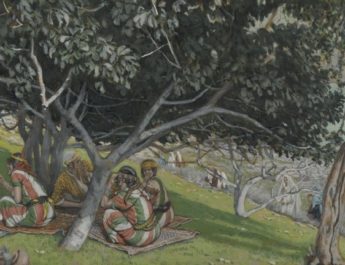Matthew 11:16-19, 25-30
Ordinary A32
16 “But to what will I compareA this generation?B It is likeC childrenD sitting in the marketplacesE and callingF to one another,
A “compare” = homoioo. 15x in NT. From homoios (similar to, resembling, like); from the same as homou (together); from homos (the same). This is to compare, liken, resemble, become similar.
B “generation” = genea. From genos (family, offspring, kin – in a literal or figurative sense); from ginomai (to come into being, to happen, become, be born; to emerge from one state or condition to another; this is coming into being with the sense of movement or growth). This is family, generation, kind, or nation. As generation, it implies an age as a period of time. It can also mean infinity. This is the root of the word “generation.
C “like” = homois. Related to “compare” in v16. See note A above.
D “children” = paidion. From pais (child, youth, servant, slave); perhaps from paio (to strike or sting). This is a child as one who is still being educated or trained. Perhaps one seven years old or younger. Used figuratively for an immature Christian.
E “marketplaces” = agora. 11x in NT. From ageiro (to gather). This is assembly, forum, marketplace, town square, thoroughfare. This is where “agoraphobia” comes from.
F “calling” = prosphoneo. 7x in NT. From pros (at, to, toward, with) + phoneo (to call out, summon, shout, address; making a sound whether of an animal, a person, or an instrument); from phone (voice, sound, tone or noise; also a language or dialect); probably from phemi to declare, say, use contrasts in speaking to shed light on one point of view); {from phao (to shine) or phaino (to bring light, cause to appear, shine, become visible or clear). This is to call to, address, give a speech, summon, exclaim.
17 ‘We played the fluteG for you, and you did not dance;H
we wailed,I and you did not mourn.’J
G “played the flute” = auleo. 3x in NT. From aulos (pipe, flute). This is to play a pipe or flute.
H “dance” = orcheomai. 4x in NT. Perhaps from orchos (a row or ring). This is to dance – as with regular movement.
I “wailed” = threneo. 4x in NT. From threnos (ailing, dirge, lamentation, crying aloud); from threomai (to cry aloud, shriek); from throeo (to be disturbed, unsettled, troubled; feeling the desire to scream from fear, very upset, startled); from throos (noise, tumult). This is to mourn or lament – particularly in a vocal way. It can also mean to sing a dirge.
J “mourn” = kopto. 8x in NT. This is to cut, strike, cut off. It can also mean beating the chest to lament and so to mourn.
18 For JohnK came neither eating nor drinking, and they say, ‘He has a demon’;L 19 the Son of ManM came eating and drinking, and they say, ‘Look,N, O a glutton and a drunkard,
K “John” = ioannes. From Hebrew yochanan (Johanan); from Yehochanan (“the Lord has been gracious”); {from YHVH (proper name of the God of Israel); {from havah (to become); from hayah (to be, exist, happen)} + chanan (beseech, show favor, be gracious; properly, to bend in kindness to someone with less status). This is John.
L “demon” = daimonion. From daimon (evil spirit, demon, fallen angel); perhaps from daio (giving out destinies). This is demon, evil spirit, god of another religion, or fallen angel.
M “Man” = anthropos. Probably from aner (man, male, husband) + ops (eye, face). This is human, humankind. Used for all genders.
N “look” = idou. From eido (to be aware, see, know, remember, appreciate). This is see! Lo! Behold! Look! Used to express surprise and or draw attention to the statement.
O {untranslated} = anthropos. Same as “Man” in v19. See note M above.
a friendP of tax collectorsQ and sinners!’R Yet wisdomS is vindicatedT by her deeds.”
P “friend” = philos. This is dear, beloved, a friend, an associate; friendship with personal affection, a trusted confidante; love from personal experience with another person.
Q “tax collectors” = telones. From telos (an end, aim, purpose, completion, end goal, consummation, tax; going through the steps to complete a stage or phase and then moving on to the next one). This is tax collector, one who worked for the Romans taking taxes from Jews. It also meant the toll house. Literally, this is “paying at the end.”
R “sinners” = hamartolos. From hamartano (to miss the mark, do wrong, make a mistake, sin); {from a (not) + meros (a part or share)}. This is sinning, sinful, sinner. It referred to missing the mark or falling short. The term was also used in archery for missing the target.
S “wisdom” = sophia. From sophos (wise, clever, skilled, learned, cultivated); related to saphes (clear). This is skill, wisdom, insight, intelligence, clarity. It is wisdom as applied through a practical skill or shrewdness. It is not thoughtfulness or the mere gaining of intelligence for its own sake. Sophia is wisdom in action for everyday living.
T “is vindicated” = dikaioo. From dikaios (correct, righteous – implies innocent; this is that which conforms to God’s notion of justice, uprightness); From dike (the principle of justice; that which is right in a way that is very clear; a decision or the execution of that decision; originally, this word was for custom or usage; evolved to include the process of law, judicial hearing, execution of sentence, penalty, and even vengeance; more commonly, it refers to what is right); may be from deiknumi (to show, point out, exhibit; figurative for teach, demonstrate, make known). This is to be righteous, plead the cause of, justify, acquit. Properly, it is being approved, particularly carrying the weight of a legal judgment. It is upright, render just, or innocent.
25 At that timeU JesusV said, “I thankW you, Father, LordX of heavenY and earth,
U “time” = kairos. This is season, opportunity, occasion. The word chronos is used for chronological time. Kairos is used for spiritually significant time – the right time or appointed time.
V “Jesus” = iesous. From Hebrew Yehoshua (Joshua, the Lord is salvation); {from YHVH (proper name of the God of Israel; the self-existent and eternal one); {from havah (to become) or from hayah (to come to pass, become, be)} + yasha (to deliver, defend, help, preserve, rescue; properly, to be open, wide or free, which implies being safe. So, in a causative sense, this is to free someone). This is Jesus or Joshua in Greek – the Lord saves or the Lord is salvation.
W “thank” = exomologeo. 10x in NT. From ek (from, from out of) + homologeo (to agree, speak the same, declare, promise, praise, celebrate; to align with, express the same conclusion, endorse); {from homologos (of one mind); {from homos (the same) + lego (to say, speak, tell)}}. This is agree, consent, or acknowledge. It can also be confess, give thanks, or praise. It includes an open, public, unabashed declaration.
X “Lord” = kurios. From kuros (authority, supremacy). This is a respectful address meaning master or sir. It refers to one who has control or power greater than one’s own. So, it was also applied to God and Jesus as Master or Lord.
Y “heaven” = ouranos. May be related to oros (mountain, hill) with the notion of height. This is the air, the sky, the atmosphere, and heaven. It is the sky that is visible and the spiritual heaven where God dwells. Heaven implies happiness, power, and eternity.
because you have hiddenZ these things from the wiseAA and the intelligentBB and have revealedCC them to infants;DD
Z “hidden” = krupto. 18x in NT. This is to hide by covering, secret, hidden things. This is the root of the word “cryptography.”
AA “wise” = sophos. Related to “wisdom” in v19. See note S above.
BB “intelligent” = sunetos. 4x in NT. From suniemi (to put together facts or ideas into a logical whole; understanding or being wise through a process of logic and discernment; implies acting piously); {from sun (with, together with) + hiemi (to send, put)}. This is intelligent, wise, discerning, clever. It is finding understanding within one’s own frame of reference by connecting facts and concepts. Focuses on the mental process of putting things together – being prudent or wise.
CC “revealed” = apokalupto. From apo (from, away from) + kalupto (to cover, hide, conceal; figuratively, to keep hidden or secret) {related to kalube (hut, cabin)}. This is properly to uncover so it means revealing something that was hidden or obstructed. It particularly refers to revealing the essence of something. This is to make plain or manifest. This is the root verb that “apocalypse” comes from.
DD “infants” = nepios. 15x in NT– used in 1 Corinthians 13 (“when I was a child…”). This may be from ne (not) + epos (word; by extension, to speak) {from epo (to answer, bring word, command). This is an infant, child, minor, or immature person. It can also be used figuratively for someone who is childish or unlearned.
26 yes, Father, for such was your gracious will.EE 27 All things have been handed overFF to me by my Father; and no one knowsGG the Son except the Father, and no one knows the Father except the Son and anyone to whom the Son choosesHH to reveal him.
EE “gracious will” = eudokia. 9x in NT. From eudokeo (to think well of, to be pleased or resolved; properly, what someone finds good or acceptable – approving of some action or generally thinking well of); {from eu (good, well, well done) + dokeo (to have an opinion, seem, appear, suppose; a personal judgment; to think); {from dokos (opinion)}}. This is goodwill, favor, happiness, delight, satisfaction, or desire. It is something that a person finds good or of benefit.
FF “handed over” = paradidomi. From para (from beside, by) + didomi (give, offer, place, bestow, deliver; give in a literal or figurative sense). This is literally to hand over – hence to deliver, abandon, or betray. It implies a personal involvement.
GG “knows” = epiginosko. From epi (on, upon, what is fitting) + ginosko (to know, recognize, realize, perceive, learn; gaining knowledge through personal experience). This is to perceive, discern, acknowledge, recognize, know exactly because of direct interaction.
HH “chooses” = boulomai. This is to wish, desire, intend. Also, to plan with great determination.
28 “ComeII to me, all you that are wearyJJ and are carrying heavy burdens,KK and I will give you rest.LL
II “come” = deute. 12x in NT. From deuro (come here, hither, hence, now, until now). This is come, follow – as an exclamatory mood.
JJ “are weary” = kopiao. Related to “mourn” in v17. From kopos (labor that leads to exhaustion, depletion, weariness, fatigue; working until worn out); from kopto (see note J above). This is working with effort, whether of the body or mind, growing weary, feeling tired, working hard.
KK “carrying heavy burdens” = phortizo. 2x in NT. From the same as phortion (burden, cargo; a load that an individual must carry that isn’t transferable; figuratively, a task or service); from phortos (load, cargo); from phero (to bear, bring, lead, make known publicly; to carry in a literal or figurative sense). This is to pack up, weigh down, burden, overload. It can be to load a vessel, an animal, or a person. Figuratively, it can be weighed down with spiritual anxiety or strain.
LL “give…rest” = anapauo. 12x in NT – including Matthew 11:28 “come to me, all you that are weary and are carrying heavy burdens, and I will give you rest.” From ana (up, again, back, among, between, anew) + pauo (to stop, refrain, pause, restrain, quit, come to an end). This is a break from work, which implies being refreshed. It denotes that rest that one gets once a necessary task is finished.
29 Take my yokeMM upon you, and learnNN from me; for I am gentleOO and humblePP in heart,QQ
MM “yoke” = zugos. 6x in NT. From zeugnumi (to yoke). This is a yoke or set of scale. It is what unites people in shared work so it is servitude or obligation.
NN “learn” = manthano. This is to learn, understand, gain experiential knowledge. It often implies a time of reflection upon key facts. This is related to the word that disciple comes from in Greek, mathetes, as well as “mathematics” in English.
OO “gentle” = praus. 4x in NT– same as “blessed are the meek” from the Beatitudes (Matthew 5:5). Related to praios (meek, gentle, kind); related to praotes (mildness kindness, meekness; being temperate – gentle, but strong; implies humility). This is gentle, meek, which implies humility.
PP “humble” = tapeinos. 8x in NT. This is low in position, depressed, low in circumstance, meek, cast down. Figuratively, it can be humiliated or low in spirit.
QQ “heart” = kardia. Literally the heart, but figuratively mind, character, inner self, will, intention, thoughts, feelings. Also, the center of something. The word heart is only used figuratively in the Old and New Testaments. This is where “cardiac” comes from.
and you will findRR restSS for your souls.TT 30 For my yoke is easy,UU and my burdenVV is light.”
RR “find” = heurisko. This is to find, learn, or obtain. It is to discover something, which generally implies a period of searching for it. This is to find in a literal or figurative sense. This is where the word “heuristic” comes from.
SS “rest” = anapausis. Related to “give…rest” in v28. 5x in NT. From anapauo (see note LL above). This is rest, tranquility, inner rest, ceasing labor, intermission.
TT “souls” = psuche. From psucho (to breathe, blow). This is breath, the breath of life, the self, individual, soul. This is the word for that which makes a person unique – their identity, will, personality, affections. This isn’t the soul as the immortal part of us, but as our individuality. It is also not life as a general concept, but specific to people. This is where the words psyche and psychology come from.
UU “easy” = chrestos. 7x in NT. From chraomai (to use, make use of, give what is needed, act in a specific way, request). This is useful, good, well-fitted, benevolent, kind, gracious. It was also a name given to slaves in the ancient world.
VV “burden” = phortion. Related to “carrying heavy burdens” in v28. 6x in NT. From phortos (see note KK above). This is burden, cargo, freight. It is an individual, non-transferable burden. Figuratively, this is a task or service.
Image credit: “Mary Magdalene in the Garden with Jesus” by Rowan and Irene LeCompte at the Washington Cathedral in Washington, D.C.




